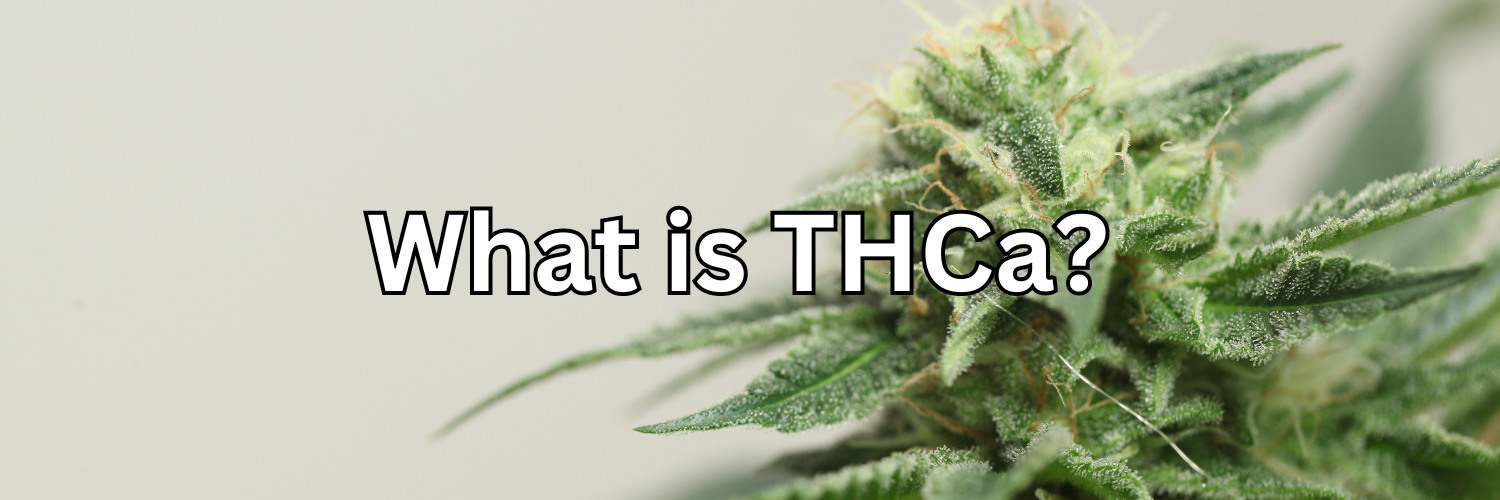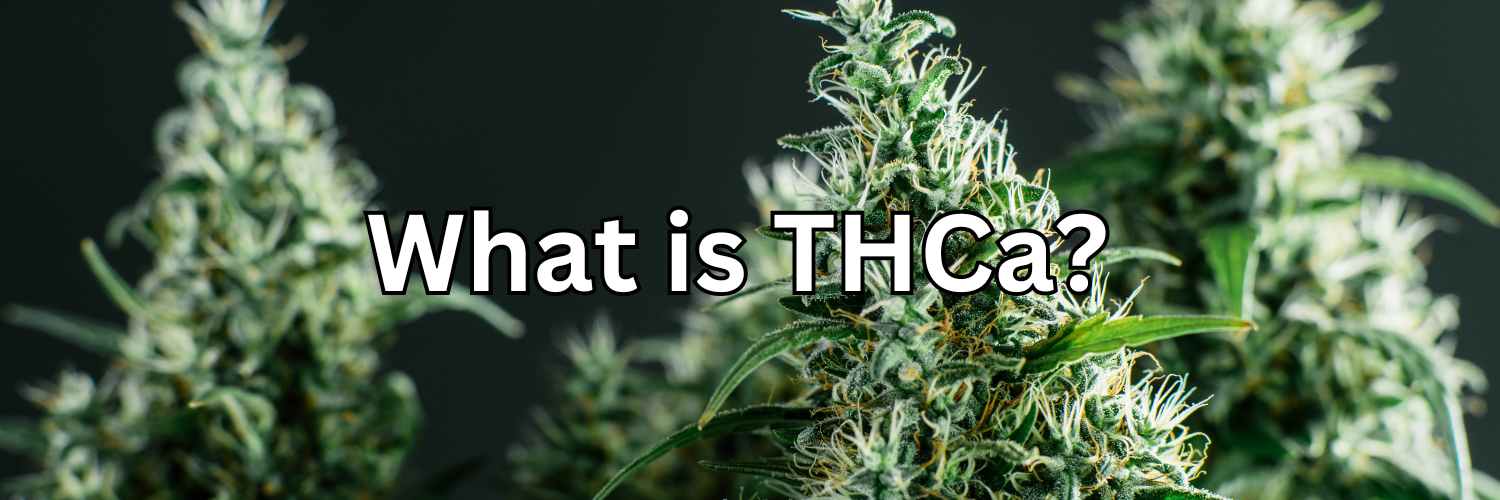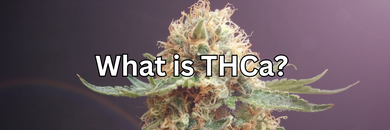THCa vs THC?
THCa compared to THC
THCa, or tetrahydrocannabinolic acid, has gained tremendous popularity and attention due to its sudden abundance in consumer hemp products. THCa is the raw form of THC that exists in the cannabis plant and needs to be activated to have any effect. THCa on its own is non-psychoactive; to produce a high, it needs to be activated into THC, or Delta 9 tetrahydrocannabinol. THC is the main psychoactive cannabinoid found in the cannabis plant, infamous for its psychoactive effects.
THCa vs. THC
What is the difference between THCa and THC?
THCa, or Tetrahydrocannabinolic acid, is the acidic form of THC that is naturally occurring in all varieties of the cannabis plant. THCa is non-psychoactive and has to be heated to be converted to THC to become psychoactive. This is why cannabis consumers don’t get high from eating raw cannabis; without heating the plant matter, the THCa will not cause a psychoactive effect. THC, short for delta 9 Tetrahydrocannabinol, is the main molecule in cannabis responsible for the high or psychoactive effects produced by the plant. Delta 9 THC works in conjunction with terpenes, other cannabinoids, and naturally occurring compounds to produce the psychoactive effect.
 How does THCa convert to THC?
How does THCa convert to THC?
When cannabis users smoke cannabis, they are conducting chemistry as their lighters, vaporizers, and various heat sources heat THCa and activate it to become THC, the form of the molecule that produces psychoactive effects. This heat activation process is known as decarboxylation, and all forms of cannabis inhalation and edible manufacturing employ this process to make cannabis psychoactive.
What happens if you consume THCa?
If you ingest pure THCa, it will not create the psychoactive effects that many people desire from THC. While the effects of THCa have not been fully researched, it is believed to have the potential to help relieve physical discomfort and help regulate healthy body function. There is substantial anecdotal evidence to support potential health benefits of THCa, but THC is a lot more potent and powerful milligram per milligram.
How to activate THCa into THC for edibles
Whether you are starting with cannabis flower or extracts like CO2, BHO, and rosin, you will need to activate the THCa to make psychoactive THC using heat. If you are planning to make edibles, it is best to use a fatty carrier oil such as coconut oil, butter, or any fatty oil that can be heated. Carefully heat the cannabis extract or plant matter into your carrier oil, ensuring the temperature of the oil does not exceed 230 degrees Fahrenheit; your target temperature range is between 215-225 F.
While you heat the oil, you will want to stir frequently to help facilitate the process of THCa converting to THC. It will be clear that the THCa is converting to THC because the acidic part of the compound escapes in the form of CO2, producing many tiny air bubbles. This is a sign that the process is working, and you will want to continue heating the plant matter or extract until there are no more air bubbles produced when you stir. Once this is done, you can filter the plant matter out, leaving you with fully activated cannabis-infused oil.

Is THCa legal under the farm bill?
THCa gained substantial popularity in 2023/2024 due to a loophole in the 2018 farm bill, which implies that THCa is legal in every state that does not have hemp regulations. The 2018 farm bill separated hemp from the Controlled Substance Act, which bans Cannabis at the federal level. In doing so, they legalized “the plant Cannabis sativa L. and any part of that plant, including the seeds thereof and all derivatives, with a [THC] concentration of not more than 0.3 percent on a dry weight basis.” There are two separate phenomena at play here: the intent of the law and the language of the law.
The intent of the Farm bill was to legalize non-psychoactive hemp compounds like CBD and CBG and only allow non-psychoactive levels of naturally occurring THC. However, THCa is a separate molecule from Delta 9 THC that needs its own separate regulations, and once the hemp industry discovered that they could market traditional psychoactive cannabis indica and cannabis sativa buds as “legal THCa hemp flower” under this loophole, the THCa industry absolutely exploded.
To clarify, there is no naturally occurring THCa hemp flower. The vast majority of “THCa flower” being sold on the market is just traditional psychoactive cannabis rebranded as hemp to meet legal loopholes. Some THCa hemp flower may be actual hemp buds rolled in cannabis-derived THCa powder, but that still makes it more of a cannabis product than a hemp product.
The issue is that cannabis hemp and cannabis indica and sativa are all in the same family - the cannabis family. They all produce terpenes, CBD, and THC to varying levels, making it impossible to truly distinguish cannabis hemp from cannabis indica or sativa varieties. The distinguishing factor between cannabis hemp and the psychoactive varieties of cannabis is supposed to be the THC levels, but THCa is a narrow loophole that blurs the line between the two.
Do the levels of THCa change over time in THCa flower?
The THCa loophole holds strong for a very short window while the plant matter is fresh and the levels of THCa are high compared to the levels of delta 9 THC. However, THCa converts to the psychoactive compound THC through time, heat, and oxidation (exposure to oxygen). This means that from the second the THCa flower is packaged, it is slowly converting, and it does not take much time, light, or heat exposure to spike the THC levels above the legal limit of 0.3%.
THCa is not a stable molecule; it naturally converts to THC over time. Measures can be taken to slow down the decarboxylation process, such as keeping THCa flower away from light, airtight, and freezing the plant matter rather than storing it at room temperature. Taking these steps just delays the inevitable; the THCa is eventually going to convert to Delta 9 THC. If you are planning to sell THCa flower, know the risks, know the ideal shelf life, and conduct your own lab testing to confirm that the Delta 9 THC levels are below 0.3%. One thing to keep in mind is if THCa vendors are sending you lab tests that are more than one month old, the THCa has started to convert to THC, and the flower should be retested.
Conclusion
In conclusion, while THCa presents an interesting opportunity for both consumers and the hemp industry, it is essential to understand the scientific, medicinal, and legal aspects of this cannabinoid. With the current legal loopholes and the natural conversion of THCa to THC, both producers and consumers need to stay informed and cautious.
Q&A about THCa
1. What is THCa?
THCa, or tetrahydrocannabinolic acid, is the non-psychoactive precursor to THC found in raw and live cannabis.
2. How is THCa different from THC?
THCa is non-psychoactive and converts to the psychoactive THC through a process called decarboxylation, which involves heat.
3. Can consuming raw cannabis get you high?
No, consuming raw cannabis will not get you high because it contains THCa, not THC. The THCa needs to be heated to convert to THC.
4. What are the potential benefits of THCa?
THCa is believed to help relieve physical discomfort and regulate healthy body function, though research is ongoing.
5. How do you convert THCa to THC for edibles?
To convert THCa to THC for edibles, heat cannabis extract or plant matter in a fatty carrier oil at a temperature between 215-225°F until the THCa converts to THC.

6. Is THCa legal?
THCa is currently considered legal under the 2018 Farm Bill, which allows for hemp products with less than 0.3% THC. However, this is a legal gray area.
7. Can THCa flower turn into THC over time?
Yes, THCa naturally converts to THC over time through exposure to heat, light, and oxygen.
8. What is decarboxylation?
Decarboxylation is the process of heating THCa to convert it into THC, the psychoactive form of the cannabinoid.
9. Is there naturally occurring THCa hemp flower?
No, the THCa flower marketed as hemp is often traditional psychoactive cannabis rebranded as hemp due to legal loopholes.
10. How should THCa flower be stored to maintain its stability?
To maintain stability, THCa flower should be kept away from light, airtight, and ideally frozen to slow down the conversion to THC.
By understanding these key aspects of THCa, both consumers and producers can navigate the market more effectively, ensuring safe and informed usage of this intriguing cannabinoid.


